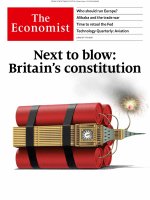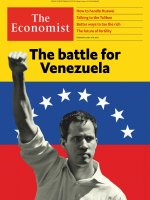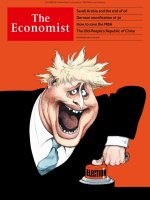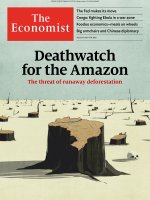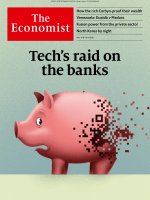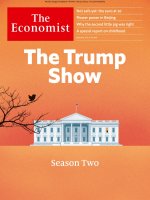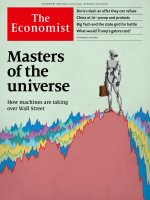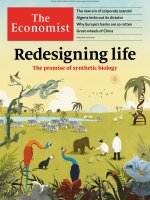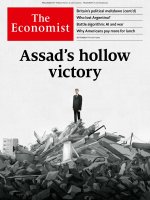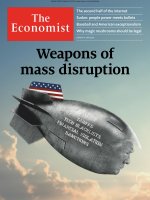The economist USA 12 10 2019
Bạn đang xem bản rút gọn của tài liệu. Xem và tải ngay bản đầy đủ của tài liệu tại đây (29.48 MB, 108 trang )
UPLOADED BY "What's News" vk.com/wsnws TELEGRAM: t.me/whatsnws
Trump and Ukraine—the backstory
India’s tottering banks
Where are all the self-driving cars?
Fake moos: the rise of plant-based meat
OCTOBER 12TH–18TH 2019
The world economy’s
strange new rules
A SPECIAL REPORT
UPLOADED BY "What's News" vk.com/wsnws TELEGRAM: t.me/whatsnws
UPLOADED BY "What's News" vk.com/wsnws TELEGRAM: t.me/whatsnws
Transformation
for a shared future
An exclusive invite-only conference for strategy and transformation
executives and thought leaders from world-class organizations to
exchange insights, share experiences and build networks.
Selected speakers include
Jim McNerney
Former Chairman, President, and CEO,
The Boeing Company
Former Chairman and CEO, 3M
Rita McGrath
Professor, Columbia Business School
Best-selling author
Ngozi Okonjo-Iweala
Rick Goings
Two-time Finance Minister of Nigeria
Former Managing Director, The World Bank
Chairman Emeritus
Tupperware Brands
Behnam Tabrizi
Sunil Prashara
Renowned expert in Transformation
Best-selling author,
and award-winning teacher
President & CEO,
Project Management Institute
(PMI)
See the full list of speakers at
events.brightline.org
BRIGHTLINE COALITION
PROJECT MANAGEMENT INSTITUTE
BOSTON CONSULTING GROUP – AGILE ALLIANCE
BRISTOL-MYERS SQUIBB – SAUDI TELECOM COMPANY
LEE HECHT HARRISON – NETEASE
ACADEMIC AND RESEARCH COLLABORATION
TECHNICAL UNIVERSITY OF DENMARK
MIT CONSORTIUM FOR ENGINEERING PROGRAM EXCELLENCE
DUKE CE – INSPER – IESE
UNIVERSITY OF TOKYO GLOBAL TEAMWORK LAB
BLOCKCHAIN RESEARCH INSTITUTE
UPLOADED BY "What's News" vk.com/wsnws TELEGRAM: t.me/whatsnws
IN
N I T I AT I V
@ WORK
New York City
Oct 24, 2019
To learn more, visit
events.brightline.org
UPLOADED BY "What's News" vk.com/wsnws TELEGRAM: t.me/whatsnws
UPLOADED BY "What's News" vk.com/wsnws TELEGRAM: t.me/whatsnws
Contents
The Economist October 12th 2019
The world this week
8 A summary of political
and business news
13
14
14
16
On the cover
The way that economies work
has changed radically. So must
economic policy: leader,
page 13. Inflation is losing its
meaning as an economic
indicator, says Henry Curr.
See our special report, after
page 48. What to make of the
strife at the European Central
Bank: Free exchange, page 79
• Trump and Ukraine—the
backstory The telephone call
that led Congress to investigate
Donald Trump was the latest
link in a long, sad and sordid
chain: briefing, page 24.
Assessing Congress’s options for
dealing with an unco-operative
White House, page 27.
Institutional conservatives
would condemn the president;
Republicans probably will not:
Lexington, page 36
• India’s tottering banks
A rotten financial system could
ruin the country’s economic
prospects: leader, page 16.
Banks’ share prices are being
hammered. Investors worry
about what horror will be
revealed next, page 73
• Where are all the self-driving
cars? The arrival of autonomous
vehicles is running late. Blame
Silicon Valley hype—and the
limits of AI: leader, page 14. The
path to driverless vehicles is long
and winding. China is taking an
alternative route to the West’s,
page 65
18
Leaders
The world economy
Strange new rules
The Middle East
The man without a plan
Autonomous cars
Traffic, jammed
India’s economy
A big stink on the brink
Pilfering potentates
Ill-gotten loot
27
28
30
32
34
36
The Americas
37 Canada’s election
38 Bello The end of Peruvian
exceptionalism
39 Ecuador’s state of
emergency
Letters
20 On our climate-change
issue
Briefing
24 Ukraine and
impeachment
The backstory
Special report:
The world economy
The end of inflation?
After page 48
United States
Congress v POTUS
Offending China
Chicago’s red line
The meaning of sex
Atlantic City
Lexington Republicans
and impeachment
41
42
42
43
44
Asia
Privilege in South Korea
Refugees in New Zealand
Thai teenage pregnancy
Singapore and Hong Kong
Banyan Violence against
women
China
46 Domestic violence
47 Emergency powers in
Hong Kong
48 Chaguan Lessons from
Tiananmen Square
49
50
51
51
52
Middle East & Africa
Turkey’s push into Syria
Protests in Iraq
Elections in Mozambique
Money to burn in Kenya
Africa’s money-launderers
Bagehot The sad fate of
the ideology that has
animated the Conservative
Party since the 1980s,
page 59
• Fake moos: the rise of
plant-based meat The potential
for a radically different food
chain, page 61
1 Contents continues overleaf
5
UPLOADED BY "What's News" vk.com/wsnws TELEGRAM: t.me/whatsnws
6
Contents
53
54
55
55
56
The Economist October 12th 2019
Europe
Poland at the polls
Building “Fort Trump”
Portugal’s election
Police murders in France
Charlemagne Russia and
the EU
73
74
75
75
76
76
77
Britain
57 Northern Ireland adrift
58 The Brexit talks founder
59 Bagehot Thatcherism’s
sad fate
78
79
Science & technology
81 The 2019 Nobel prizes
83 Global health
84 Spider silk and bacteria
International
61 Fake moos: plant-based
meat
65
66
67
68
68
69
70
Finance & economics
India’s failing banks
America’s economy
HKEX throws in the towel
South Korean nationalism
Tether’s travails
Killing the credit card
Buttonwood The power
of narratives
Vatican scandal
Free exchange Strife at
the ECB
85
86
87
87
88
Business
Self-driving China
Blacklisting Chinese AI
Bartleby In praise of
dissenters
Planemaking’s duopoly
Saudi Aramco
Spillover from GM’s strike
Schumpeter Is Airbnb
another Uber?
Books & arts
Reading at the South Pole
The East India Company
The danger of charts
An heiress at war
Peace orchestras
Economic & financial indicators
92 Statistics on 42 economies
Graphic detail
93 Among critics of Israel, conservatives are most likely
to be anti-Semitic
Obituary
94 Shuping Wang, exposer of an HIV scandal
Subscription service
Volume 433 Number 9164
Published since September 1843
to take part in “a severe contest between
intelligence, which presses forward,
and an unworthy, timid ignorance
obstructing our progress.”
Editorial offices in London and also:
Amsterdam, Beijing, Berlin, Brussels, Cairo,
Chicago, Johannesburg, Madrid, Mexico City,
Moscow, Mumbai, New Delhi, New York, Paris,
San Francisco, São Paulo, Seoul, Shanghai,
Singapore, Tokyo, Washington DC
For our full range of subscription offers, including digital only or print and digital combined, visit:
Economist.com/offers
You can also subscribe by mail, telephone or email:
North America
The Economist Subscription Center,
P.O. Box 46978, St. Louis, MO 63146-6978
Telephone: +1 800 456 6086
Email:
Latin America & Mexico
The Economist Subscription Center,
P.O. Box 46979, St. Louis, MO 63146-6979
Telephone: +1 636 449 5702
Email:
One-year print-only subscription (51 issues):
Please
United States..........................................US $189 (plus tax)
Canada......................................................CA $199 (plus tax)
Latin America.......................................US $325 (plus tax)
PEFC/29-31-58
PEFC certified
This copy of The Economist
is printed on paper sourced
from sustainably managed
forests certified to PEFC
www.pefc.org
© 2019 The Economist Newspaper Limited. All rights reserved. Neither this publication nor any part of it may be reproduced, stored in a retrieval system, or transmitted in any form or by any means, electronic, mechanical, photocopying,
recording or otherwise, without the prior permission of The Economist Newspaper Limited. The Economist (ISSN 0013-0613) is published every week, except for a year-end double issue, by The Economist Newspaper Limited, 750 3rd
Avenue, 5th Floor, New York, N Y 10017. The Economist is a registered trademark of The Economist Newspaper Limited. Periodicals postage paid at New York, NY and additional mailing offices. Postmaster: Send address changes to The
Economist, P.O. Box 46978, St. Louis , MO. 63146-6978, USA. Canada Post publications mail (Canadian distribution) sales agreement no. 40012331. Return undeliverable Canadian addresses to The Economist, PO Box 7258 STN A, Toronto,
ON M5W 1X9. GST R123236267. Printed by Quad/Graphics, Saratoga Springs, NY 12866
UPLOADED BY "What's News" vk.com/wsnws TELEGRAM: t.me/whatsnws
UPLOADED BY "What's News" vk.com/wsnws TELEGRAM: t.me/whatsnws
8
The world this week Politics
Protests against the government continued in Iraq. The
authorities responded with
force, killing more than 100
people and wounding 4,000.
The government also shut
down the internet and
imposed curfews, but it has
been unable to fix the economy
or curb graft.
Turkey invaded northern Syria
to crush Kurdish militias, after
Donald Trump said he would
pull American troops out of the
region, giving Turkey a green
light. President Trump was
widely condemned for
abandoning the Kurds, who
fought alongside America
against Islamic State and still
guard captured is prisoners in
camps. He justified the betrayal by claiming that the Kurds
“didn’t help us in the second
world war”. Actually, they did.
Kurds of the Assyrian Parachute Company fought for the
Allies in Greece and Albania,
among other places.
An election observer in
Mozambique was shot dead,
allegedly by police, ahead of a
presidential poll already
marred by violence and
irregularities.
Veiled threats
Hong Kong’s government
invoked a colonial-era emergency law to ban the wearing of
masks during protests. Thousands of people, many of them
masked, protested. Others
clashed with police, started
fires and vandalised property,
resulting in the first closure of
the city’s mass-transit rail
network in 40 years.
The Economist October 12th 2019
Nationalists and supporters of
the Communist Party in China
claimed to be outraged by the
general manager of the Houston Rockets, who had tweeted
the words “Fight for freedom,
stand with Hong Kong”. China’s state broadcaster, cctv,
suspended broadcasts of
games involving America’s
National Basketball Association. Other Chinese firms
severed ties with it. Basketball
stars are still free to criticise
America.
North Korea and America
resumed disarmament talks
for the first time in seven
months. But North Korea broke
them off after a day, accusing
America of intransigence. The
dictatorship threatened to test
more long-range missiles and
nuclear bombs if it does not get
more of what it wants by the
end of the year.
The lower house of Malaysia’s
parliament voted for a second
time to repeal the country’s
“fake news” law, which was
imposed by the previous government to stifle criticism.
Thailand ordered owners of
publicly accessible wireless
networks to keep records of
their customers’ identities or
their browsing history, to help
the authorities identify people
who criticise the government
or the monarchy.
New Zealand’s government
said it would admit more
refugees, and scrap rules that
have impeded applicants from
Africa and the Middle East.
Failed statecraft
Negotiations between the
European Union and Britain
over Brexit appeared close to
collapse. Boris Johnson, Britain’s prime minister, had put
forward a new deal he thought
the House of Commons might
accept, but the eu said it would
be hard to resolve differences
before the October 31st dead- 1
UPLOADED BY "What's News" vk.com/wsnws TELEGRAM: t.me/whatsnws
The Economist October 12th 2019
2 line. After Downing Street
briefed that it was all the fault
of Germany and Ireland, Donald Tusk, the president of the
eu, told Mr Johnson to stop the
“stupid blame game”. That was
the mildest rebuke Mr Johnson
has faced in recent weeks.
The world this week 9
short of an overall majority,
suggesting that the prime
minister, António Costa, will
again have to seek allies on the
radical left.
Lenín and the people
A gunman spouting antiSemitic slogans killed two
people in the German city of
Halle and tried to force his way
into a synagogue.
France’s security services
faced scrutiny following the
killing of four policemen in
Paris earlier this month by a
colleague. The murderer, a
Muslim convert, turned out to
have praised the slaughter in
2015 of 12 people at Charlie
Hebdo, a satirical magazine, for
poking fun at the Prophet. Yet
he still had access to top-secret
police intelligence files.
Portugal’s Socialist Party won
the most seats in the country’s
general election. But it fell
In Ecuador protesters complained about the withdrawal
of fuel subsidies, at one point
forcing their way into parliament. The unrest, the worst the
country has seen for years,
prompted the government to
move temporarily from the
capital, Quito, to the port city
of Guayaquil. Lenín Moreno,
the president, defended the
cuts. His supporters pointed
out that the subsidies were
costly, wasteful and ecologically damaging. But they are
popular.
Álvaro Uribe, Colombia’s
president from 2002 to 2010,
was questioned before the
supreme court about accusations that through his lawyer
he had tried to bully and bribe
witnesses to retract claims that
he had helped set up a unit of a
paramilitary group in the
1990s. In 2012 Iván Cepeda, a
left-leaning senator, first
accused Mr Uribe of having
links to paramilitary groups.
Mr Uribe denies wrongdoing.
A constitutional clash
America’s Democrats promised
subpoenas to make officials
testify in their impeachment
inquiry, after the White House
said it would not co-operate.
Having urged Ukraine to investigate Joe Biden, Donald
Trump publicly called on
China, too, to investigate his
potential election rival. Meanwhile, Ukraine’s prosecutorgeneral said he was reviewing a
number of closed investigations, including a case against
the energy firm that had employed Mr Biden’s son. He said
he had not been put under any
pressure to do so.
It emerged that Bernie Sanders suffered a heart attack
when he was admitted to hospital with what his campaign
had described as “chest discomfort”. He vowed to appear
at the next Democratic debate.
Microsoft uncovered attempts
by hackers linked to the
Iranian government to target
email accounts associated with
an American presidential
campaign, reportedly Mr
Trump’s. Though unsuccessful
in their cyberattack, Microsoft
said the hackers were “highly
motivated” and “willing to
invest significant time and
resources” in their endeavour.
UPLOADED BY "What's News" vk.com/wsnws TELEGRAM: t.me/whatsnws
10
The world this week Business
The oecd advanced proposals
to ditch the current rules covering international corporate
tax, “which date back to the
1920s and are no longer sufficient” in a globalised world,
and create a system that acknowledges the “digitalisation” of the world economy.
The plan would end decades of
practice by allowing a country
to tax a company that does
“significant business” within
its borders, even if it has no
base there. The oecd wants to
create a multilateral framework to override the patchwork
of unilateral laws. The new
system would apply not only to
tech companies such as Apple
and Facebook, which have
been criticised for avoiding tax
in countries like Britain and
France, but also luxury-goods
firms, carmakers and other
highly globalised industries.
Hong Kong’s stock exchange
dropped its £32bn ($39bn)
unsolicited bid for the London
Stock Exchange. The lse had
rejected the offer, reiterating
its commitment to buy
Refinitiv, a financial-data
provider. The British bourse
has said it sees Shanghai as the
gateway to Chinese markets,
and has forged closer links
with investors there.
Trying to put the era of Carlos
Ghosn behind it, Nissan appointed Makoto Uchida as its
new chief executive, replacing
the ousted Hiroto Saikawa,
who was Mr Ghosn’s protégé.
Mr Uchida will head a new
three-man leadership team at
the Japanese carmaker, which
is slashing production in the
face of falling sales.
bp announced that Bob Dudley
is to retire as chief executive
early next year and be replaced
by Bernard Looney, who heads
its upstream business. Mr
Dudley took the helm at bp in
2010, soon after the Deepwater
Horizon disaster, steering the
company through a flood of
legal claims that ate into its
profits. Before that he had
headed tnk-bp, the company’s
joint venture in Russia, which
eventually fell foul of the
authorities.
The Economist October 12th 2019
A jury in Philadelphia ordered
Johnson & Johnson to pay
$8bn in punitive damages to a
man who claims his childhood
use of Risperdal, an antipsychotic drug, caused him to
grow breasts. The company,
which faces more than 13,000
lawsuits over Risperdal, said it
would appeal against the verdict, which it described as
“excessive and unfounded”.
United States
Unemployment rate, %
12
10
8
6
4
2
0
1969
80
90
2000
10
19
Source: Bureau of Labour Statistics
America’s unemployment
rate dropped to a 50-year low,
of 3.5%. A broader measure of
under-utilisation in the labour
market fell to 6.9%, its lowest
since 2000.
The dark ages
Millions of people in northern
California had their electricity
cut off by Pacific Gas & Electric, as the utility endeavoured
to prevent wildfires ignited by
its power lines. pg&e filed for
bankruptcy protection in
January amid claims that its
equipment had sparked deadly
infernos. The blackout could
last for days and affects Silicon
Valley and the Bay Area, though
not San Francisco. Southern
California Edison said it was
considering similar action,
which would affect the Los
Angeles area.
America lost its top spot to
Singapore in the World
Economic Forum’s annual
competitiveness index. Hong
Kong, the Netherlands and
Switzerland made up the rest
of the top five. Britain was
ninth in the 141-country survey.
At a signing ceremony at the
White House, America and
Japan sealed their new trade
deal. The Trump administration sought the accord after
pulling out of a transpacific
agreement, which covers 11
countries. This bilateral pact is
more limited in scope, mostly
covering agricultural goods
and avoiding thorny issues,
such as car exports. Still, the
deal does lower tariffs, a
change from the tit-for-tat
penalties levied in America’s
dispute with China. Ahead of
another increase in tariffs on
$250bn-worth of Chinese
goods, Chinese officials travelled to Washington for a
further round of trade talks.
Ahead of the talks, America
increased the pressure on
China by adding more Chinese
companies to its trade
blacklist, including startups
working in artificial intelligence. One of them, Megvii,
which develops facial-recognition technology, had recently
filed for an ipo in Hong Kong.
America says the firms are
“implicated in the implementation of China’s
campaign of repression”
against Muslims in Xinjiang.
Meanwhile, Apple pulled an
app from the iPhone that enabled protesters in Hong Kong
to map police movements after
it was heavily criticised in
Chinese state media.
A slice of life
News that PizzaExpress might
fold unless it can restructure
its debt prompted campaigns
on Twitter to save the 54-yearold restaurant group. Founded
in London, the chain helped
pioneer casual dining in Britain, concentrating its branches
in upper-crust areas. It has
gone through several privateequity owners. In response to
the outpouring of affection,
the pizza firm tweeted that “it
feels good to be kneaded” and
reassured investors that it was
“still making dough”.
UPLOADED BY "What's News" vk.com/wsnws TELEGRAM: t.me/whatsnws
This document has been issued by Pictet Asset Management Inc, which is registered as an SEC Investment Adviser, and may not be reproduced or distributed, either in part or in full, without their prior authorisation.
Past performance is not a guide to future performance. The value of investments and the income from them can fall as well as rise and is not guaranteed. You may not get back the amount originally invested.
Responsibility
is intangible.
Except to
our clients.
Geneva Zurich Luxembourg London Amsterdam
Brussels Paris Frankfurt Madrid Milan Dubai
Montreal Hong Kong Singapore Taipei Osaka Tokyo
assetmanagement.pictet
UPLOADED BY "What's News" vk.com/wsnws TELEGRAM: t.me/whatsnws
“The ultimate prize will be
Dr. Jim Allison | Cancer Researcher & Nobel Laureate
Dr. Jim Allison’s breakthrough in immunotherapy earned him the 2018 Nobel Prize and transformed
cancer care. Groundbreaking research like this allows our world-renowned team of experts to offer the
most innovative clinical trials and leading-edge treatments – giving more hope to patients and families.
Choose MD Anderson first. Call 1-855-894-0145 or visit MakingCancerHistory.com.
Ranked number one in the
nation for cancer care by
U.S. News & World Report.
UPLOADED BY "What's News" vk.com/wsnws TELEGRAM: t.me/whatsnws
Leaders
Leaders 13
The world economy’s strange new rules
The way that economies work has changed radically. So must economic policy
R
ich-world economies consist of a billion consumers and
millions of firms taking their own decisions. But they also
feature mighty public institutions that try to steer the economy,
including central banks, which set monetary policy, and governments, which decide how much to spend and borrow. For the
past 30 years or more these institutions have run under established rules. The government wants a booming jobs market that
wins votes but, if the economy overheats, it will cause inflation.
And so independent central banks are needed to take away the
punch bowl just as the party warms up, to borrow the familiar
quip of William McChesney Martin, once head of the Federal Reserve. Think of it as a division of labour: politicians focus on the
long-term size of the state and myriad other priorities. Technocrats have the tricky job of taming the business cycle.
This neat arrangement is collapsing. As our special report explains, the link between lower unemployment and higher inflation has gone missing. Most of the rich world is enjoying a jobs
boom even as central banks undershoot inflation targets. America’s jobless rate, at 3.5%, is the lowest since 1969, but inflation is
only 1.4%. Interest rates are so low that central banks have little
room to cut should recession strike. Even now some are still trying to support demand with quantitative easing (qe), ie, buying
bonds. This strange state of affairs once looked temporary, but it
has become the new normal. As a result the
rules of economic policy need redrafting—and,
in particular, the division of labour between
central banks and governments. That process is
already fraught. It could yet become dangerous.
The new era of economic policy has its roots
in the financial crisis of 2007-09. Central banks
enacted temporary and extraordinary measures
such as qe to avoid a depression. But it has since
become clear that deep forces are at work. Inflation no longer
rises reliably when unemployment is low, partly because the
public has come to expect modest price rises, and also because
global supply chains mean prices do not always reflect local labour-market conditions. At the same time an excess of savings
and firms’ reluctance to invest have pushed interest rates down.
So insatiable is the global appetite to save that more than a quarter of all investment-grade bonds, worth $15trn, now have negative yields, meaning lenders must pay to hold them to maturity.
Economists and officials have struggled to adapt. In early 2012
most Fed officials thought that interest rates in America would
settle at over 4%. Nearly eight years on they are just 1.75-2% and
are the highest in the g7. A decade ago, almost all policymakers
and investors thought that central banks would eventually unwind qe by selling bonds or letting their holdings mature. Now
the policy seems permanent. The combined balance-sheets of
central banks in America, the euro zone, Britain and Japan stand
at over 35% of their total gdp. The European Central Bank (ecb),
desperate to boost inflation, is restarting qe. For a while the Fed
managed to shrink its balance-sheet, but since September its assets have started to grow again as it has injected liquidity into
wobbly money-markets. On October 8th Jerome Powell, the Fed’s
chairman, confirmed that this growth would continue.
One implication of this new world is obvious. As central
banks run out of ways to stimulate the economy when it flags,
more of the heavy lifting will fall to tax cuts and public spending.
Because interest rates are so low, or negative, high public debt is
more sustainable, particularly if borrowing is used to finance
long-term investments that boost growth, such as infrastructure. Yet recent fiscal policy has been confused and sometimes
damaging. Germany has failed to improve its decaying roads and
bridges. Britain cut budgets deeply in the early 2010s while its
economy was weak—its lack of public investment is one reason
for its chronically low productivity growth. America is running a
bigger-than-average deficit, but to fund tax cuts for firms and the
wealthy, rather than road repairs or green power-grids.
While incumbent politicians struggle to deploy fiscal policy
appropriately, those who have yet to win office are eyeing central
banks as a convenient source of cash. “Modern monetary theory”, a wacky notion that is gaining popularity on America’s left,
says there are no costs to expanding government spending while
inflation is low—so long as the central bank is supine. (President
Donald Trump’s attacks on the Fed make it more vulnerable.)
Britain’s opposition Labour Party wants to use the Bank of England to direct credit through an investment board, “bringing together” the roles of chancellor, business minister and Bank of
England governor.
In a mirror image, central banks are starting
to encroach on fiscal policy, the territory of governments. The Bank of Japan’s massive bondholdings prop up a public debt of nearly 240% of
gdp. In the euro area qe and low rates provide
budgetary relief to indebted southern countries—which this month provoked a stinging attack on the central bank by some prominent
northern economists and former officials (see Free exchange).
Mario Draghi, the ecb’s outgoing president, has made public appeals for fiscal stimulus in the euro zone. Some economists
think central banks need fiscal levers they can pull themselves.
Here lies the danger in the fusion of monetary and fiscal policy. Just as politicians are tempted to meddle with central banks,
so the technocrats will take decisions that are the rightful domain of politicians. If they control fiscal levers, how much money should they give to the poor? What investments should they
make? What share of the economy should belong to the state?
A new frontier
In downturns either governments or central banks will need to
administer a prompt, powerful but limited fiscal stimulus. One
idea is to beef up the government’s automatic fiscal stabilisers,
such as unemployment insurance, that guarantee bigger deficits
if the economy stalls. Another is to give central banks a fiscal tool
that does not try to redistribute money, and hence does not invite a feeding frenzy at the printing presses—by, say, transferring
an equal amount into the bank account of every adult citizen
when the economy slumps. Each path brings risks. But the old
arrangement no longer works. The institutions that steer the
economy must be remade for today’s strange new world. 7
UPLOADED BY "What's News" vk.com/wsnws TELEGRAM: t.me/whatsnws
14
Leaders
The Economist October 12th 2019
America and the Middle East
The man without a plan
Donald Trump’s sudden withdrawal from northern Syria betrays a shallow and incoherent policy in the Middle East
B
ehold the “great and unmatched wisdom” of President Donald Trump. On October 6th he announced that American
troops would withdraw from northernmost Syria, all but endorsing a Turkish offensive against America’s Kurdish allies in the region. He did not warn the Kurds, who had fought bravely against
the jihadists of Islamic State (is). It was time to let others, such as
Russia and Iran, “figure the situation out”, he said. But hours later, after even his Republican colleagues objected, Mr Trump
stepped back. Turkey, he warned, should not do anything that he
considers “off limits”. Ignoring him, Turkish forces launched a
campaign on October 9th that threatens not only to revive is, but
also to condemn Syria to yet another cycle of slaughter.
The conflicting signals, sent by Mr Trump in a series of incoherent tweets, have confused everyone. But they
should surprise no one. This is what American
diplomacy looks like in the Trump era. When the
president’s closest advisers are not chasing up
conspiracy theories in Ukraine (see Briefing), or
defying the constitution by refusing to testify to
Congress (see United States section), they are
coping with a commander-in-chief who, according to his own former secretary of state, “is
pretty undisciplined, doesn’t like to read, doesn’t read briefing
reports, doesn’t like to get into the details of a lot of things, but
rather just kind of says: ‘This is what I believe.’” That is no way to
make policy anywhere in the world, least of all the Middle East.
Mr Trump is understandably frustrated by being stuck in the
region. America has had troops in Syria for five years and Iraq for
a decade and a half. His solution, backed by many Americans, is
“to get out of these ridiculous Endless Wars”. In December, with a
similarly rash announcement, he began withdrawing from Syria, prompting his secretary of defence, James Mattis, to resign.
About 1,000 American troops are now in the country, down from
2,000 last year. Only about a dozen diplomats remain in America’s once-teeming embassy in Baghdad, a city beset by deadly
protests. When Mr Trump visited the city last winter, he stuck to
a remote air base and left without seeing Iraq’s leaders.
America’s allies should shoulder more of the burden in the
Middle East, as Mr Trump keeps saying. But he is wrong to think
that he can leave the region without any consequences (see Middle East & Africa section). In Syria America’s withdrawal and a
Turkish invasion risk throwing the north into chaos and exacerbating ethnic tensions. That would please is, which the Pentagon warns is resurgent, as is al-Qaeda. In 2011 Barack Obama also
hastily pulled out of Iraq, leaving behind a cauldron of ethnic hatred that gave rise to is. Mr Trump, like his predecessor, may find
that withdrawal is soon followed by re-engagement—when he
might regret abandoning his Kurdish allies.
The president’s retreat creates a vacuum, allowing America’s enemies to exert more influence in the region. The abandoned Kurds are already talking of turning for support to Russia
and Bashar al-Assad, Syria’ s dictator. Iran is an
even bigger concern. Last year Mr Trump abandoned a deal that curbed its nuclear programme
(and might just have smoothed America’s path
out of the Middle East) in part because it said
nothing about Iranian meddling in the region. But after stoking
tensions with a policy of “maximum pressure”, Mr Trump has allowed Iran or its proxies to attack shipping and Saudi oil facilities with nothing more than a few sanctions in return. Nor has
Mr Trump worked hard to counter Iran’s increasing sway in Syria
and Iraq, where the American-backed government is wobbling.
The reason presidents find it hard to leave the Middle East is
that America has interests there. Pulling back requires planning
to protect them. But, as the confusion over Syria shows, Mr
Trump has no plan. When faced with the thorny issues presented
by withdrawal, which had presumably featured in those unread
briefings, his response has been to throw up his hands and turn
his back. There is nothing wise about that. 7
Autonomous cars
Traffic, jammed
The self-driving future is running late. Blame Silicon Valley hype—and the limits of ai
F
ew ideas have enthused technologists as much as the selfdriving car. Advances in machine learning, a subfield of artificial intelligence (ai), would enable cars to teach themselves to
drive by drawing on reams of data from the real world. The more
they drove, the more data they would collect, and the better they
would become. Robotaxis summoned with the flick of an app
would make car ownership obsolete. Best of all, reflexes operating at the speed of electronics would drastically improve safety.
Car- and tech-industry bosses talked of a world of “zero crashes”.
And the technology was just around the corner. In 2015 Elon
Musk, Tesla’s boss, predicted his cars would be capable of “com-
plete autonomy” by 2017. Mr Musk is famous for missing his own
deadlines. But he is not alone. General Motors said in 2018 that it
would launch a fleet of cars without steering wheels or pedals in
2019; in June it changed its mind. Waymo, the Alphabet subsidiary widely seen as the industry leader, committed itself to
launching a driverless-taxi service in Phoenix, where it has been
testing its cars, at the end of 2018. The plan has been a damp
squib. Only part of the city is covered; only approved users can
take part. Phoenix’s wide, sun-soaked streets are some of the easiest to drive on anywhere in the world; even so, Waymo’s cars
1
have human safety drivers behind the wheel, just in case.
UPLOADED BY "What's News" vk.com/wsnws TELEGRAM: t.me/whatsnws
UPLOADED BY "What's News" vk.com/wsnws TELEGRAM: t.me/whatsnws
16
2
Leaders
The Economist October 12th 2019
Jim Hackett, the boss of Ford, acknowledges that the industry
“overestimated the arrival of autonomous vehicles”. Chris Urmson, a linchpin in Alphabet’s self-driving efforts (he left in 2016),
used to hope his young son would never need a driving licence.
Mr Urmson now talks of self-driving cars appearing gradually
over the next 30 to 50 years. Firms are increasingly switching to a
more incremental approach, building on technologies such as
lane-keeping or automatic parking. A string of fatalities involving self-driving cars have scotched the idea that a zero-crash
world is anywhere close. Markets are starting to catch on. In September Morgan Stanley, a bank, cut its valuation of Waymo by
40%, to $105bn, citing delays in its technology.
The future, in other words, is stuck in traffic. Partly that reflects the tech industry’s predilection for grandiose promises.
But self-driving cars were also meant to be a flagship for the power of ai. Their struggles offer valuable lessons in the limits of the
world’s trendiest technology.
Hit the brakes
One is that, for all the advances in machine learning, machines
are still not very good at learning. Most humans need a few dozen
hours to master driving. Waymo’s cars have had over 10m miles
of practice, and still fall short. And once humans have learned to
drive, even on the easy streets of Phoenix, they can, with a little
effort, apply that knowledge anywhere, rapidly learning to adapt
their skills to rush-hour Bangkok or a gravel-track in rural
Greece. Computers are less flexible. ai researchers have expend-
ed much brow-sweat searching for techniques to help them
match the quick-fire learning displayed by humans. So far, they
have not succeeded.
Another lesson is that machine-learning systems are brittle.
Learning solely from existing data means they struggle with situations that they have never seen before. Humans can use general
knowledge and on-the-fly reasoning to react to things that are
new to them—a light aircraft landing on a busy road, for instance, as happened in Washington state in August (thanks to
humans’ cognitive flexibility, no one was hurt). Autonomouscar researchers call these unusual situations “edge cases”. Driving is full of them, though most are less dramatic. Mishandled
edge cases seem to have been a factor in at least some of the
deaths caused by autonomous cars to date. The problem is so
hard that some firms, particularly in China, think it may be easier to re-engineer entire cities to support limited self-driving
than to build fully autonomous cars (see Business section).
The most general point is that, like most technologies, what is
currently called “ai” is both powerful and limited. Recent progress in machine learning has been transformative. At the same
time, the eventual goal—the creation in a machine of a fluid,
general, human-like intelligence—remains distant. People need
to separate the justified excitement from the opportunistic
hyperbole. Few doubt that a completely autonomous car is possible in principle. But the consensus is, increasingly, that it is not
imminent. Anyone counting on ai for business or pleasure
could do worse than remember that cautionary tale. 7
India’s economy
A big stink on the brink
India’s future should be bright. A rotten financial system could ruin it
I
magine a central bank tweeting that, yes, there are rumours make loans to shadow banks, which went on their own lending
of “certain” banks facing deposit runs but “there is no need to binge, often using the money to finance property projects.
Today the financial system is stuffed with bad debts. Perhaps
panic”. Would you feel reassured? That is the unenviable position Indians found themselves in last week as a financial storm a tenth of loans are dud, maybe more. The shadow banks are vulrumbled on in the world’s fifth-biggest economy with no sign of nerable because they use short-term debt (rather than ordinary
the authorities getting a firm grip. In the latest fiasco a co-oper- deposits, which they are mostly restricted from raising) to fund
ative bank, pmc, is accused of fraud, prompting depositors to long-term loans of their own. There is also an undercurrent of
yank their cash out. Meanwhile shares in Yes Bank, a private fraud and bogus accounting. In 2018 Punjab National Bank said
that a diamond dealer had stolen $2bn from it.
lender, have collapsed by 40% in the past month
Later that year il&fs, a big shadow bank with
as rumours swirl. These are not isolated inciIndia’s Yes Bank
Share
price,
rupee
government links, collapsed. Credit-rating
dents. Roughly a third of the financial system is
400
agencies have been giving high ratings to flaky
on crutches or under suspicion. Dazed by the
300
firms. With suspicion rife, a handful of shadow
scale of the task, the government and the Re200
banks face a severe funding squeeze, and the enserve Bank of India (rbi) are dithering. Until
100
tire financial sector is wary of lending. As a rethey act, India’s economy will not perk up—and
0
2018
2019
sult credit is growing at near its slowest pace in
there is a danger of a full-blown crisis.
20 years. The ripple effect has stalled building
The origins of this mess go back to 2005. In
the first phase conventional banks, which control about four- projects, starved wholesalers of loans to buy inventory and prefifths of the system’s assets and are mostly state-run, lent too vented farmers from borrowing to buy tractors and motorbikes.
The response of Narendra Modi’s government and the rbi has
freely to infrastructure and industrial projects, sometimes ones
backed by well-connected tycoons. The plight today is a continu- so far been halting. The government has repeatedly but belatedly
ation of the second phase: a boom-and-bust in lightly regulated pumped inadequate sums of capital into the state banks, and
shadow banks, which control the remaining fifth of the system. promised to merge some of them. On September 20th it slashed
The danger grew in 2016 when the government temporarily abol- corporate taxes to try to revive animal spirits. The rbi, meanished large banknotes, leading many people to deposit money in while, has cut interest rates five times this year. Presumably they
banks and mutual funds. These, in turn, used the windfall to hope that this will be enough to boost the economy, while the big 1
UPLOADED BY "What's News" vk.com/wsnws TELEGRAM: t.me/whatsnws
©Photograph: patriceschreyer.com
C O LLE C TIO N
BEIJING · CANNES · DUBAI · GENEVA · HONG KONG · KUALA LUMPUR · LAS VEGAS · LONDON · MACAU · MADRID
MANAMA · MOSCOW · MUNICH · NEW YORK · PARIS · SEOUL · SHANGHAI · SINGAPORE · TAIPEI · TOKYO · ZURICH
UPLOADED BY "What's News" vk.com/wsnws TELEGRAM: t.me/whatsnws
18
Leaders
The Economist October 12th 2019
2 state banks slowly regain their strength and the remaining well-
run private banks, such as hdfc and Kotak, lend more freely.
The crisis, however, cannot be compartmentalised. Shadow
banks have borrowed from bad banks which may have borrowed
from good ones. Another collapse in one corner could easily
cause panic elsewhere. Because the banks are in poor shape, the
rbi’s interest-rate cuts are not being passed on to consumers and
firms. Another lurch down in the economy threatens a new series of bad debts at the recuperating state banks. And there is a
palpable sense that governance is broken. Bank boards, auditors,
rating agencies and the rbi have all failed to stop the rot.
India needs a two-pronged clean up. In the short term the rbi
should do another “stress test” of the banks, and test the shadow
banks, too. The results should be made public. If state banks
need capital they should get it. Some shadow banks will fail and
should be wound up. The approach taken with il&fs offers a
template. It was put into a form of administration and creditors
face a big haircut (although the process could be quicker). In the
longer run, India should privatise its state banks so that they can
escape control by politicians. Shadow lenders, meanwhile,
should face the same prudential rules as banks. The rbi needs to
overhaul its system of ongoing supervision. It used to be widely
admired, but is starting to look like part of the problem.
This ought to be India’s moment. It has a big domestic economy and lots of entrepreneurs, oil prices are fairly low—helpful
for a big importer—and multinationals are keen to shift their
factories out of China. Cleaning up the financial system is a gigantic task. But until it is done India will not thrive. 7
Pilfering potentates
How to keep your ill-gotten loot
A guide for kleptocrats worried by foreign prosecutors
S
o you’ve stolen a billion dollars. That was the easy part. The
country of which you are president may be poor, which is a
pity, but it is also lawless, which creates opportunities. The auditors, police and prosecutors who should have slapped the hand
you put in the treasury chose to kiss it instead. So your pockets
are bulging with ill-gotten loot. There is just one snag: the world
has grown less tolerant of kleptocrats.
Back in the good old days of the cold war, strongmen could be
strongmen. When Mobutu Sese Seko, the late dictator of what is
now the Democratic Republic of Congo, robbed his country into
a coma, no one cared. (Apart from his subjects, of course.) When
his household drained 10,000 bottles of pink champagne a year
and Mobutu kept a Concorde idling on the runway of his tropical
palace, his Western backers turned a blind eye, so long as he did
not invite the Soviets into central Africa. Likewise, the Soviets
overlooked the equally egregious thievery of
their clients in Angola. And a kleptocrat in those
days had no trouble finding places to park his
squillions. Swiss bankers vied to offer him
roomy vaults. Estate agents on the Côte d’Azur
rolled out the gold-thread carpet.
Recently, however, Western governments
have been confiscating looted assets and prosecuting those involved in corruption far beyond
their borders (see Middle East & Africa section). This year America’s Justice Department indicted a former finance minister of
Mozambique and won convictions against several ex-Credit
Suisse bankers over the embezzlement of $2bn in loans. Malaysia’s former prime minister, Najib Razak, lost his job and his liberty after America revealed that he had $700m in personal bank
accounts; American prosecutors are still pursuing his alleged
money-launderer. Last month Swiss authorities auctioned off
$27m-worth of sports cars seized from Teodorin Nguema
Obiang, the unaccountably wealthy son of the president of Equatorial Guinea, a tiny oil-rich dictatorship. It was not his first
brush with foreign law enforcement. In 2014 he had to hand over
assets worth $30m after America’s Justice Department said he
had embarked on a “corruption-fuelled” shopping spree “after
raking in millions in bribes and kickbacks”. Everywhere, pilfer-
ing potentates and their progeny must be nervous.
So here are some steps they can take to safeguard their loot.
First, stay away from social media. The younger Mr Obiang posed
on Instagram in fancy cars and on private jets. That may have impressed his friends, but it also raised awkward questions about
how he could afford such extravagant toys.
Second, avoid purchases so conspicuous that they make
headlines. Kolawole Akanni Aluko, a Nigerian businessman accused of bribery, not only spent $80m on a superyacht—he also
reportedly rented it to Jay-Z and Beyoncé for $900,000 a week.
These (blameless) singers attract a certain amount of attention.
Mr Aluko might have avoided unwelcome scrutiny had he
bought a less blingtastic boat.
Third, keep an emergency stash close to hand. The late Robert
Mugabe, who misruled Zimbabwe for three decades, always travelled with a suitcase of “coup money”, in case he
was ousted while abroad. Cash piles must be
looked after, mind. A former ruler of Equatorial
Guinea, Francisco Macías Nguema, kept a large
portion of the country’s foreign reserves in a
bamboo hut in his garden. He forgot to waterproof the hut, alas, and much of his stash rotted.
One way to protect overseas assets is to claim
they belong to the state. The younger Mr Obiang
stopped France from selling his home in Paris by insisting it was
owned by his country’s embassy. His lawyers also say that a
$100m superyacht seized by the Netherlands was a naval vessel.
Prosecutors are mystified as to what military purpose might be
served by the upper deck’s jacuzzi. Another way to elide the distinction between public and personal property is to be royal.
Mswati III, the absolute monarch of Eswatini (formerly Swaziland) lives like a king—and it’s legal. Gulf royals were reportedly
among the bidders for Mr Obiang’s cars.
One final thought. How about ruling honestly? This is not as
crazy as it sounds. Mo Ibrahim, a Sudanese-British telecoms tycoon, has endowed a $5m prize each year for an African president who governs well and retires when his term is up. You can
live quite well on $5m. Yet for seven of the 12 years since the Ibrahim prize began, no worthy recipient has been identified. 7
UPLOADED BY "What's News" vk.com/wsnws TELEGRAM: t.me/whatsnws
Three continents.
One truly
global MBA.
Leading with world-class
expertise in Shanghai, Barcelona,
Washington D.C. and St. Louis.
Grounded in data, driven by values,
informed by key global priorities:
Create a world of difference with a
WashU MBA from Olin Business School.
olin.wustl.edu
UPLOADED BY "What's News" vk.com/wsnws TELEGRAM: t.me/whatsnws
20
Letters
Our issue on climate change
Limiting temperature rises to
2°C above pre-industrial
norms would still leave atmospheric carbon dioxide at well
over 450 parts per million
(ppm) (“What goes up”,
September 21st). We evolved,
and until less than a century
ago, lived, on a 300ppm planet.
We need to return the Earth’s
climate to its pre-industrial
state, without doing the same
to our economy.
The un recently hosted the
first Global Forum on Climate
Restoration. Entrepreneurs
and climate scientists discussed the undoubtedly gargantuan challenge of removing
and permanently storing
around a trillion tonnes of
carbon from the atmosphere
by 2050, and presented
technically viable ways to do
this. Even if market-based
approaches to remove carbon
dioxide fail entirely, and they
won’t, a reasonable estimate is
that it would cost 3-5% of
global gdp for 20-30 years to
return the atmosphere to
300ppm. As a comparison, ten
years ago America diverted
3.5% of its annual gdp to
prevent the financial system
from collapsing. That felt like a
good investment. So does this.
jon shepard
Global Development Incubator
London
Your article on British offshore
wind suggested that the technology remains expensive
(“The experiment”). Yet the
latest auctions produced a
price of about £40 ($50) per
megawatt hour, well below the
current wholesale price of
electricity. Offshore wind is
now the cheapest way of
producing power in Britain.
You also supported Dieter
Helm’s acerbic criticisms of
British energy policy for
directing subsidies towards
particular technologies, such
as offshore wind. The recent
auctions are a spectacular
rebuttal of Professor Helm’s
theory. It is precisely because
Britain has protected offshore
wind over the past 15 years that
the technology has now
become unbelievably cheap. It
The Economist October 12th 2019
is often difficult for economists such as Professor Helm
to recognise this, but active
industrial policies can work.
Lastly, you repeated the
conventional final attack on
offshore wind, pointing out
that it is intermittent. Other
countries around the North Sea
have woken up to this problem,
usually focusing on various
technologies for converting
“power to gas” as a way of
ensuring this intermittency
can be managed at enormous
scale. The hibernation of energy policy over recent years has
held up progress, but my
hypothesis is that Britain will
soon conclude, like other
countries, that using surplus
power to make renewable
hydrogen is the logical route
forward. This hydrogen will
then be used to generate power
when electricity supplies are
scarce from the North Sea.
chris goodall
Oxford
cleaner air, improved health
and fewer premature deaths,
which exceed policy costs. We
also estimated that these
immediate benefits may be
larger than the near-term gains
from mitigating climate
change. Societies, therefore,
have ample reason to act on
climate change now.
emil dimanchev
Senior research associate
mit Centre for Energy and
Environmental Policy
Research
Cambridge, Massachusetts
Polluting cannot be free. A
strong price on carbon will
incentivise producers and
consumers to reduce emissions and innovators to create
low-carbon technologies. And
returning all the funds raised
back to the economy means
little to no economic loss and a
much healthier future. Though
the politics are challenging, as
advocates are up against a wall
of money, the American House
of Representatives is considering four bipartisan bills that
do just this, and one, the
Energy Innovation Act, has 64
co-sponsors.
jerry hinkle
Governing board
Citizens Climate Lobby
Coronado, California
It is true that climate change is
not just an environmental
problem and cuts across all
activities. Yet the recipe for
economic growth from mainstream economists, including
The Economist, disregards
climate change. Yes, economics textbooks cover externalities or spillover effects, but
these have not been integral to
growth analysis. A search finds
abundant climate studies, but
less than 0.5% of the numerous growth articles over the
past 50 years seem to factor
climate effects.
That allows politicians such
as Jair Bolsonaro, Brazil’s president, to argue that environmental protection is inimical
to growth, even as the emerging reality is the opposite.
American policy, too, sees any
deregulation, including policy
that mortgages the environment, as pro-growth. Yes,
environmental destruction
may boost short-term growth,
but the climate outcomes hurt
long-term growth and welfare.
So, changing the conduct of
growth economics is essential
if we are to avert a climate
catastrophe. Unless the
economics profession stops
ranking and rewarding coun-
You observed that most of the
benefits from reducing greenhouse-gas emissions “will be
accrued not today, but in 50 or
100 years.” It is worth adding
that societies reap meaningful
and immediate benefits from
transitioning away from fossil
fuels. In a recent research
paper, our team found that
replacing fossil fuels with
renewable energy yields
substantial short-term
benefits associated with
In your article on small island
states and climate diplomacy,
you failed to mention the
effects of rising and shifting
sea floor, and that volcanic
islands can and do naturally
sink (“Nothing so concentrates
the mind”). Balanced reporting
would merit at least a quick
mention of these facts.
joy savage d’angelo
Fort Worth, Texas
tries based primarily on how
much they deregulate and
boost short-term gdp, the
climate action that you rightly
call for will continue to lag
dangerously.
vinod thomas
A former senior vice-president
at the World Bank
Bethesda, Maryland
Climatologists are like economists. They repeatedly produce
false predictions based on
skewed statistics and erroneous models. Neither wholly
understand their respective
cycles. Climatologists want to
twiddle the carbon-dioxide
knob just as central bankers
twiddle interest rates.
The Economist is fuelling
peak-hysteria near the top of a
climate bull market. The
inevitable climate bear market
will be more sudden, geologically, longer and colder than
any climatologist can at
present imagine.
james holme
Bickenbach, Germany
Your newspaper has now
shown itself to have joined the
alarmist warmists. You have
lost your way and attached
yourself to the ranks of the
activists. Very disappointing.
In order to avoid misleading
your readers you should
rename your publication The
Alarmist.
tony powell
Niagara-on-the-Lake, Canada
As a longtime reader of The
Economist, I have often been
moved by the Obituary column, but I was astonished to
find myself weeping over the
death of the Okjökull glacier in
Iceland, a response triggered as
much by the beauty of the
writing as the poignancy of the
event. Later that day I called my
broker and divested all my
fossil-fuel holdings.
page nelson
Charlottesville, Virginia
Letters are welcome and should be
addressed to the Editor at
The Economist, The Adelphi Building,
1-11 John Adam Street, London WC2N 6HT
Email:
More letters are available at:
Economist.com/letters
UPLOADED BY "What's News" vk.com/wsnws TELEGRAM: t.me/whatsnws
UPLOADED BY "What's News" vk.com/wsnws TELEGRAM: t.me/whatsnws
22
Executive focus
DIRECTOR (D-1)
Duty Station: New York, USA
The United Nations University (UNU) has been a go-to think tank for
impartial research on the pressing global problems of human survival, conflict
prevention, development and welfare, for the past four decades. With more
than 400 researchers in 13 countries, UNU’s work spans the full breadth of
the 17 SDGs, generating policy-relevant knowledge to effect positive global
change in furtherance of the purposes and principles of the Charter of the
United Nations.
The Centre: UN University’s Centre for Policy Research (UNU-CPR) in New
York is an independent think tank within the United Nations system. We
combine research excellence with deep knowledge of the multilateral system
to generate innovative solutions to current and future global public policy
challenges. The Centre currently has four programme areas: (i) Preventing
Violent Conflict; (ii) Digital Technology and Global Order; (iii) Fighting Modern
Slavery and Human Trafficking; and (iv) The Future of Multilateralism.
The Position: The Director provides strategic leadership and management of
UNU-CPR programmes, representing UNU in New York.
Qualifications: The Director should have qualifications that lend to UNU-CPR
the necessary credibility in the international policy community and provide
leadership and quality control in the conduct of UNU-CPR activities.
Experience: A master’s degree or doctoral qualification in Public Policy,
Political Science, Law, Economics, or International Development. Knowledge
of and experience in the think-tank world. Detailed knowledge of the UN and
of its functions and activities. Strong international research background and
publications. Expertise related to policy research, knowledge translation and
research communication.A proven record of effective policy thought leadership.
Strong and demonstrable international fundraising skills. Sound financial and
human resource management skills. Gender, cultural and political sensitivity.
Fluency in English is required. Fluency in another official UN language is
desirable.
Application deadline: 8 November 2019 for a summer 2020 start.
Full details of the position and how to apply: />
UPLOADED BY "What's News" vk.com/wsnws TELEGRAM: t.me/whatsnws
Executive focus
DIRECTOR
The Middle East Institute (MEI) at the National University of Singapore
is looking for a director to lead its research into areas of relevance to
Singapore and Asia.
MEI, an autonomous research institute within the university, covers the
Middle East and North Africa (MENA), Turkey, Afghanistan and Central
Asia. It is an institute unique in South-east Asia for its focus, and is part
of one of the world’s top universities.
As Director, you would set and deliver the yearly research agenda for
MEI and ensure its focus aligns with the key interests of stakeholders,
while inspiring and guiding a team of highly motivated, respected
researchers.
MEI also has a strong public education role, and the Director will fulfil
this by conceptualising lectures and seminars, among other events.
This senior research and management role is open to those who either
hold a PhD in a relevant field of study that has focused on the Middle East
or relevant and sufficient work experience in the Middle East and a deep
understanding of the region.
Strong knowledge of how the Middle East interacts with South-east,
South and North-east Asia will be a major advantage.
For more details about the job and how to apply, go to:
/>Applications will close on 12 January, 2020.
23
UPLOADED BY "What's News" vk.com/wsnws TELEGRAM: t.me/whatsnws
24
Briefing Ukraine and impeachment
The backstory
KIEV
The telephone call that led Congress to investigate Donald Trump was the latest
link in a long, sad and sordid chain
V
iktor yanukovych, out of office,
found himself in a bind. Having become prime minister of Ukraine in 2002,
he had expected to be elected president in
December 2004. The official count in the
election had borne out his expectation. But
thousands of orange-clad demonstrators
had subsequently taken to the streets of
Kiev to protest that the tally had been
rigged. The Supreme Court ordered a recount. The result was overturned.
Post-Soviet Ukraine was just 13 years
old, and adrift. A home to hardline Communists and ardent nationalists alike in
the 1980s, part of its territory long engaged
with Europe, part stalwartly Russian, it had
no real tradition of statehood. Oligarchsin-the-making took advantage of that lack
to carve up the country’s considerable
rents and assets. Some of these oligarchs
went into politics; some cultivated politicians. All sought and bought protection
from people with power in Russia, Europe
and America. Ukrainian politics and for-
eign relations became an extension of the
oligarchs’ business interests. Its parliament became a market.
After the election of 2004 Mr Yanukovych’s stock plummeted—which was bad
news for Rinat Akhmetov. A coal and steel
magnate based in Donbas, an industrial region in eastern Ukraine, Mr Akhmetov was
one of the main sponsors of Mr Yanukovych and his Party of Regions. If they were
to regain power, Mr Yanukovych would
have to win the next election more or less
fairly. That would mean overhauling his
image. So Mr Akhmetov introduced Mr Yanukovych to Paul Manafort.
Mr Manafort thought he was on to a
good thing. A consultant to Republican
politicians in America, he also had a lucrative business tending to unsavoury overseas clients such as Jonas Savimbi, an Angolan guerrilla leader and Mobutu Sese
Seko, a Congolese dictator. He and his team
had turned Mr Yanukovych, whose nickname during his short stints in prison
The Economist October 12th 2019
when young had been kham, or “thug”,
from a Kremlin-backed bully into a selfmade man with blue-collar roots. Charismatic would have been too much to hope
for, but his tailored suits, Politburo hair
and deliberate manner gave him a plausibly presidential demeanour. He seemed
practical and solid, the salt of the earth.
The campaign Mr Manafort devised for
this remade candidate used tactics he had
first seen used in Richard Nixon’s re-election campaign in 1972: exploiting cultural
divisions and stoking grievances. Mr Yanukovych was portrayed as a defender of the
Russian-speaking east against western Ukrainians who wished to force a new language and culture on them while exploiting their economic resources. He raged
against the joint exercises Ukraine was
holding with nato in Crimea. When the
American ambassador tried to get Mr Manafort to rein him in, he was rebuffed.
The election of 2010, which was pretty
much above board, saw Mr Yanukovych become president. As such, he made Mykola
Zlochevsky, a burly, shaven-headed tycoon, his minister for ecology and natural
resources. In the early 2000s Mr Zlochevsky had been chair of the State Committee
for Natural Resources at a time when companies he had started had been granted lucrative oil-exploration licences. These licences were cancelled under the new
regime that came to power in 2005, though 1
